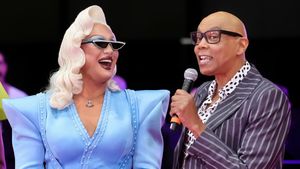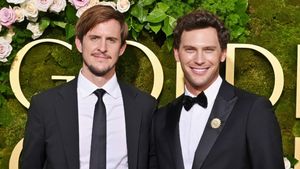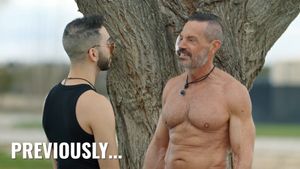
Treatment GuideJust DiagnosedSex & DatingAfrican AmericanStigmaAsk the HIV DocPrEP En EspañolNewsVoicesPrint IssueVideoOut 100
CONTACTCAREER OPPORTUNITIESADVERTISE WITH USPRIVACY POLICYPRIVACY PREFERENCESTERMS OF USELEGAL NOTICE
© 2025 Pride Publishing Inc.
All Rights reserved
All Rights reserved
By continuing to use our site, you agree to our Private Policy and Terms of Use.
A new year ' the first month always sprinkled with resolutions, fresh starts, and crowded gyms. There seems to be hope, renewed commitment to things perhaps once forgotten. And there is focus on defining the year ahead. For me, like so many others, it involves a look at my career, dating, and of course my ongoing commitment to the conversation around HIV/AIDS. I had three goals before the start of the new year: (1) get through the hundreds of e-mails I had received following my last column, December 1; (2) arrange dinner with my ex-boyfriend, someone I had not seen in a while but missed dearly and was hoping to forge some type of relationship with; and (3) figure out what was next for this column, the greater cause, and the conversation. Each seemed doable. Dinner was arranged, thoughts were started, and on December 30, while waiting for my ex-boyfriend Adam to arrive, I would sit down at my computer to work on goal number 1. I was about 15 e-mails in when a familiar name caught my eye. The involuntary reaction of my stomach churning was no doubt an indication of the enclosed message. There are only two names that could incite such an emotional reaction, and this was one of them. The other was a former love named Matt, to whom I said goodbye in the mental ward of St. Vincent's Hospital four years ago after drug abuse and a fragile mind got the best of him. But that's another column. This name was from a more recent part of my life; I had seen him numerous times over the past year in parties, bars, and restaurants, and I even remember that when I glanced out at the audience the night of my AIDS Walk fund-raiser, he was there. All the times I saw him, I never spoke, I never said hello, and I did everything I could to avoid him. His e-mail subject line was "What's Next?' An apt title, given my thought process. The body of the note would deliver on this question more specifically as it related to him, me, and what was. I couldn't get through the words fast enough; there was still hope that I would be wrong about the direction I thought it might it go in. As quickly as I had those thoughts, I would come across this portion, beginning with the message's third sentence: 'Perhaps your first column, if you are still writing it, can answer the question of why you didn't call and inform me of your status given our last time. And you should also know I tested positive that same year, shortly after you. ... I'm positive, Tyler.' My heart sank, for him, for me, but mainly for my decisions. The author of this e-mail was at one time a friend and someone with whom I would be intimate days before my diagnosis. The last time we slept together was a not-so-safe moment. You remember those things as a gay man, the times you were cautious but pushed the limits, said you would be careful but had clearly taken a risk. We had even acknowledged it that night, he having just tested negative, and my test results due back in literally a few days. All seemed fine, given my track record of negative results, including my most recent, three months earlier. We would conclude there was nothing to worry about ' so we thought. We would part ways that Saturday morning, and I would never talk to him again. And that was by choice, the very choice he was now challenging. Following my diagnosis I told only a few people; among them were three individuals with whom I had been sexually active. This was a gesture displaying my ability to 'do the right thing.' Truth is, there was no way any of those three people would have contracted HIV from me, given our interaction. Thinking back, these calls like mental check boxes reassuring myself I was a good person, reclaiming some sense of responsibility in a time when it felt like irresponsibility was written on my face, my medical records, and soon, my life. The only catch was, I should have called four people; I never made that last call. My worst fear was true, and I knew he had concluded I was the one responsible. Even if there was no way of knowing for certain, you can't argue with someone's truth. His exact words were ' I am positive, I don't want to blame you, but unfortunately I can map it back to you and knowing you didn't call or reach out, watching you avoid me is beyond wrong. Who does that?' But this wasn't about who infected him ' we both knew that. It was about the decisions I made outside the bedroom. He would go on to challenge how I could in good conscience talk about being honest and responsible and having a conversation when I had denied that conversation to him. He would explain that he still had told only a handful of people; he would, like so many others, ask for my discretion. There was no question, I was wrong. No excuse or reason or answer is going to fix that. But I hope that understanding the path I took exposes even more the struggles so many people still face when confronted with HIV. I didn't call because I was scared. He knew my friends. If I had given it to him, or it was assumed that I had, I thought I would be blacklisted. What if he told everyone? The fear was paralyzing at the time. I immediately began crafting all the ways I was not responsible, how it could have been dozens of other people; quick judgment and even dismissal, taking no responsibility. After all, I had done all the right things; how dare someone make the assumption it was me and call me wrong? But I was just that, wrong. I always knew calling was the right to thing to do; ignoring was the wrong thing in so many ways. But by the time I had disclosed my status in 2009, I had gone so far to separate from him, it was easier to simply let the past fade away. Out of sight, out of mind. The last few lines of his of his note would explain how tormented he had been by my clear disregard of this situation, and in what were perfectly selected words, almost as if he had been following my speeches and column, he wrote that what I had done 'was just not a human way to handle it.' He was right. This is one of my most regrettable moments. I share this as a reminder, as we each embark on our own 'What's Next,' that our actions make us active participants in someone else's journey. We can't forget that there is a difference between right and wrong, good and bad, and it matters which one we choose. We need to realize that more often than not, rights and wrongs are not decided by religion, law, or your parents but dictated by what instinctively feels like the 'right' thing to do. The human thing to do. And when mistakes happen, we should not only hold others accountable but hold ourselves accountable as well. And accountability doesn't mean trying to cancel out that one wrong with 100 other rights; we must face it and fix it and own it. This one e-mail did more than hold me accountable. It reminded me of the power of our actions, the impact of our voice, the necessity of our collective tolerance to move us closer to a place that is not just livable or sustainable but is thriving. This year will mark the 30 years since the start of the AIDS epidemic. I look forward to embarking on another year of 'Living the Questions' and keeping the conversation in the forefront of our minds in the hope that our social approach to this disease will catch up with our medical treatments. But this requires each of us to be accountable for our part in that process. So before I get too far into 'What's Next,' I pause to apologize and take responsibility for the conversation I ignored far too long. And I can't help but wonder how many others should do the same. --- Tyler Helms is an award-winning advertising executive and former TV journalist. Originally from Atlanta, Tyler has been HIV-positive since 2007, on medication since June 2009, and sharing his story publicly since World AIDS Day, 2009.
From our Sponsors
Most Popular
Why activist Raif Derrazi thinks his HIV diagnosis is a gift
September 17 2024 12:00 PM
How fitness coach Tyriek Taylor reclaims his power from HIV with self-commitment
September 19 2024 12:00 PM
Out100 Honoree Tony Valenzuela thanks queer and trans communities for support in his HIV journey
September 18 2024 12:00 PM
The freedom of disclosure: David Anzuelo's journey through HIV, art, and advocacy
August 02 2024 12:21 PM
Creator and host Karl Schmid fights HIV stigma with knowledge
September 12 2024 12:03 PM
From ‘The Real World’ to real life: How Danny Roberts thrives with HIV
July 31 2024 5:23 PM
Eureka is taking a break from competing on 'Drag Race' following 'CVTW' elimination
August 20 2024 12:21 PM
California confirms first case of even more deadly mpox strain
November 18 2024 3:02 PM
Plus: Featured Video
Latest Stories
A camp for HIV-positive kids is for sale. Here's why its founder is celebrating
January 02 2025 12:21 PM
This long-term HIV survivor says testosterone therapy helped save his life.
December 16 2024 8:00 PM
'RuPaul's Drag Race' star Trinity K Bonet quietly comes out trans
December 15 2024 6:27 PM
Ricky Martin delivers showstopping performance for 2024 World AIDS Day
December 05 2024 12:08 PM
AIDS Memorial Quilt displayed at White House for the first time
December 02 2024 1:21 PM
Decades of progress, uniting to fight HIV/AIDS
December 01 2024 12:30 PM
Hollywood must do better on HIV representation
December 01 2024 9:00 AM
Climate change is disrupting access to HIV treatment
November 25 2024 11:05 AM
Post-election blues? Some advice from mental health experts
November 08 2024 12:36 PM
Check out our 2024 year-end issue!
October 28 2024 2:08 PM
Meet our Health Hero of the Year, Armonté Butler
October 21 2024 12:53 PM
AIDS/LifeCycle is ending after more than 30 years
October 17 2024 12:40 PM
Twice-yearly injectable lenacapavir, an HIV-prevention drug, reduces risk by 96%
October 15 2024 5:03 PM
Kentucky bans conversion therapy for youth as Gov. Andy Beshear signs 'monumental' order
September 18 2024 11:13 AM
Study finds use of puberty blockers safe and reversible, countering anti-trans accusations
September 11 2024 1:11 PM
Latinx health tips / Consejos de salud para latinos (in English & en espanol)
September 10 2024 4:29 PM
The Trevor Project receives $5M grant to support LGBTQ+ youth mental health in rural Midwest (exclusive)
September 03 2024 9:30 AM
Introducing 'Health PLUS Wellness': The Latinx Issue!
August 30 2024 3:06 PM
La ciencia detrás de U=U ha estado liberando a las personas con VIH durante años
August 23 2024 2:48 PM















































































